Biography
1908 June 2. Miklós Pfisterer was born in Pest.
1914-1918 His father in the first world war was in frontline service.
1916 His beloved grandfather died.
1919-1926 He studied at Werbőczy István High School (today it called Petőfi).
He was the notary of the Congregatio Mariana.
1925 In the Holy Year he went on pilgrimage with his parents: Venice, Rome, Florence, Assisi, Napoly, Pompei
1926 With his essay The gipsy’s figure in hungarian literature he won the national literature competition.
His teacher László Vajthó invites him to the Napkelet journal editors ofiice. He picks up Szentkuthy as his writer name.
1926-1931 He studied at Pázmány Péter University, he became a teacher with english, french and hungarian major.
1927-1929 His articles are regularly published in Napkelet. He formed frienship with Antal Szerb, Gábor Halász, Béla Hamvas and Dezső Kerecsényi.
1928 At a university seminar he met Dóra Eppinger, his future wife.
Professor Emil Grósz operates his eyes, to get rid of his squint eye.
He went on a long european cruise with his father.
He started to write his big novel Prae.
1929 He worked on his doctoral dissertation, which is called: The relation of reality and irreality in Ben Jonson’s classical naturalism.
1931. October 19. He married Dóra Eppinger.
1931-1932 He got a one year scholarhip in Englang to develop his dissertation.
1931 The relation of reality and irreality in Ben Jonson’s classical naturalism is published.
1932 October 8. His daughter Marion Pfisterer is born.
He formed friendship with the writer László Németh
The Mária Hercz love begins.
1932-1939 He was a substitute teacher in the Barcsay street Madách High School
1934 He published his first big novel Prae.
1935 He published Towards the One and Only Metaphore.
1935-1936 He won a tender to attend a 3-4 week long cruise.
1936 He was the founding member of Kelemen Mikes Academy.
The Válasz journal publishes his works.
He published Chapter on Love.
1937 Trip to Italy with István Sőtér.
He sees the Tintoretto exhibition. The plan for Saint Orpheus’ Breviarium is born.
He meets his another great love Betta.
1938 He slapped one of his student, and becuse of that he got fired.
He published a call for his upcoming novel St. Orpreus Breviary. The Marginalia on Casanova gets published, the first piece of the Black Orpheus Notebooks. The novel was banned by the hungarian authorities because of defamation of religion and public indecency.
The second part of the Orpheus Notebooks the Black Renaissance published.
1938-1948 He teaches at the Árpád High Scool in Óbuda.
1940 In the Orpheus Notebook series he published Escorial.
1941 He published the next two Orpheus books Europa Minor and Cynthia.
His articles are regularly published in Magyar Csillag journal.
In his Myth’s myth essay he attacks Károly Kerényi mythology proffessor.
1941-1945 His articles are regularly published in Magyar Csillag, Ezüstkor and Magyarok journals.
1942 The 6th Orpheus notebook Confession and puppetry is published. After this book there is a 31 year gap till the next one in the St. Orpheus Breviary cycle.
1943 He meets his girlfriend Magda Sártory.
1944-1945 In the last stage of WW II. he served in Buda Castle as a air defense commander.
1945-1948 His articles are regularly published in journals Válasz and Magyarok. He writes radio plays, and gives lectures at free univerity.
1946 May 9. He moved to XII. district Szilágyi Erzsébet alley 28. 1th floor, he lived there until his death.
1947 His work awarded with Baumgarten Award. He got a one year scholarship to England, he went to London with his wife. The purpose of his journey is to set up a hungarian cultural house in England.
His daughter Marion went to Switzerland to study. (Marion stays abroad, courently she lives in Italy.)
1948 The hungarian state withdraws the license of his England stay.
While he is abroad he gets fired from Árpád High School.
1949-1958 High scool teacher at Kossuth Lajos Technical School.
1951 He suffers big losses: his love Betta gets deported, his friend Miklós Tóth gets hanged.
1952-1956 He lives from his translations. He often visited Magda Sártory at Gánt. Later on Magda lived with them until her death in 1978.
1954. November 4. His father died.
1956. February 18. His monther died.
1957 Divertimento gets published, it’s his first work that was asked by a publisher, and gets printed by them.
1957-1967 He published his Biography fantasia novels about Mozart, Haydn, Dürer, Goethe and Händel. He later wanted to publis those five novels in one with the title: Biography in masks.
1958 He retiers from teaching.
1958-1988 He lives only for his works.
1966 Angelic Gigi is puplished.
1967 For his 60th birthday PEN Club holds a party. István Vas’ speach is crucial for his reputation as a writer.
On February 21th Marion’s son is born, Nicola Francesco Filippo Legnani.
1972 II. Sylvester’s second life is published by Magvető Publisher.
1973 After a 31 year break the St. Orpheus Breviary is published in two volume. The edition contains the 6 Black Orpheus Notebooks and II. Sylvester’s second life.
1974 The parisian Magyar Műhely published a Szentkuthy special volume. His tranlation of James Joyce Ulysses published by Európa Publisher.
Canonized despair the 8th part of the St. Orpheus Breviary published in a III. volume.
1974-1978 He suffers from serious depression, because of that he can’t write.
1975 March 21. Európa Publisher awarded him for his James Joyce Ulysess tranlation.
1977 He got a József Attila Award.
Mária Tompa (maiden name: Müntzberger) meets the family. She became Szentkuthy’s editor. She edited 7 books in Szentkuthy’s life, and 16 books after the writer’s death.
1978 For his 70th birhday he got a state award for his works.
In the summer he is hospitalized with pneumonia.
1979 His grandson picks up the name Pfisterer.
1980 The second edition of Prae is published. It was chaptered by Maria Tompa, instructed by Szentkuthy.
1982 He got the Füst Milán Award.
1983 January 6. – May 7. Lóránd Kabdebó makes a life’s work interview with him for Petőfi Literarture Museum. The title is: Frivolity and confession.
October For his 75th birthday they held an event at Kossuth Club. He talked with György Somlyó poet, Márta Pardavi-Horváth physicist and Dr. György Vikár psychiatrist.
November 10. He held a lecture with Gábor Tolnai, Ferenc Takács about James Joyce at Eötvös Loránd University.
1984 The IX. part of St. Orpreus Breviary the Bloody donkey published, edited Mária Tompa under Szentkuthy’s instruction.
He got the Déry Tibor Award.
Magvető Publisher awarded him for the Bloody donkey.
The second edition of Chapter on Love is published by Szépirodalmi Publisher. Lóránt Kabdebó in his review said that this is the most modern book of the year.
1985 Towards the One and Only Metaphore second edition by Szépirodalmi Publisher.
Testament of the muse’s the extended version of Definition’s and roles is also published by them.
1986 June Twelve hour long interview got recorded by Dialóg Film Studio. Ordered by Andárs Jeles. Interviewer Pál Réz.
1987 His manuscrips got transfered from National Széchényi Library to Petőfi Literature Museum.
1988 Frivolity and confession life work’s interview book published, edited by Maria Tompa.
He got a Kossuth Award.
The Hungarian Radio awarded him for his James Joyce Ulysess traslation.
His 80th birthday was celebrated by his family, friends and the literary life.
June 18. He died in Budapest.
Pictures
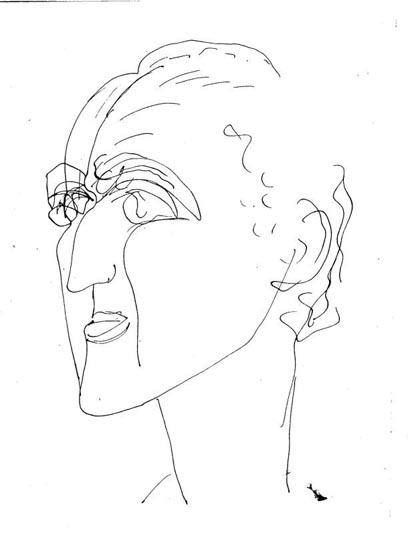
Drawing of Miklós Borsos 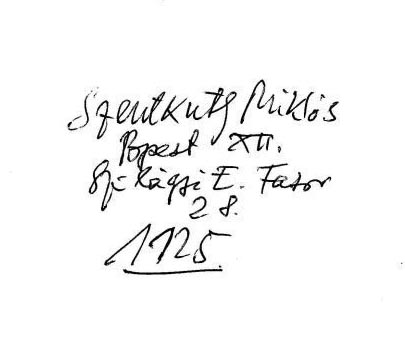
Szentkuthy Miklós Kézírásos címe 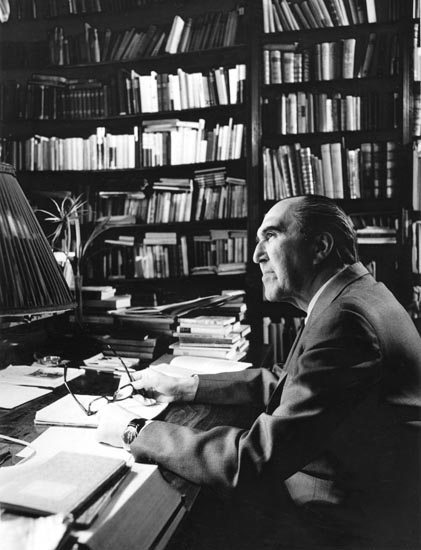
Fotó: Balla Demeter, 1973 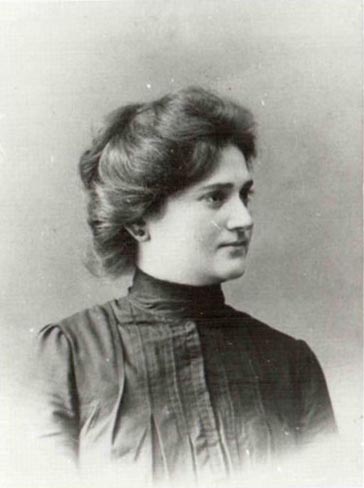
Pfisterer Lajosné, Szentkuthy-Pfisterer Miklós édesanyja 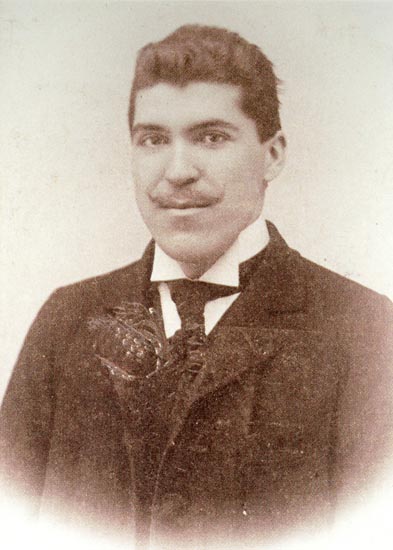
Pfisterer Lajos, Szentkuthy-Pfisterer Miklós édesapja 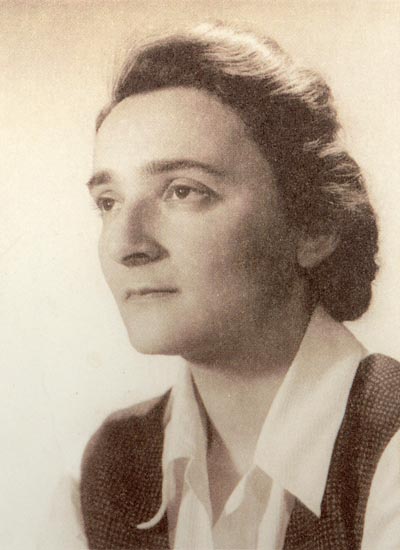
Dr. Eppinger Dóra, Szentkuthy-Pfisterer Miklós felesége 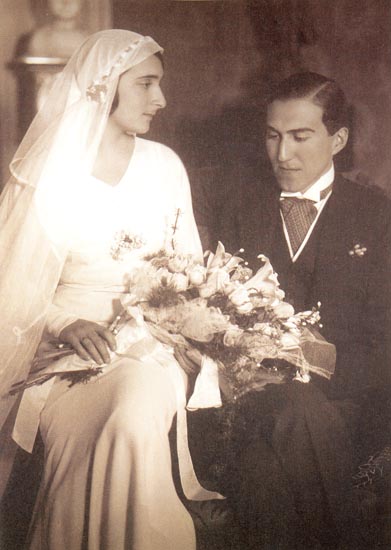
Eppinger Dóra és Szentkuthy-Pfisterer Miklós esküvői felvétele, 1931. 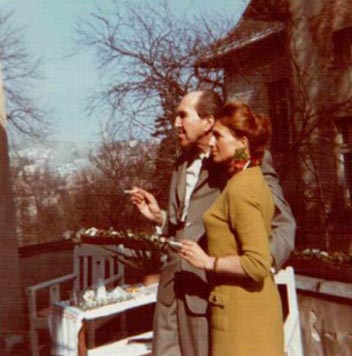
Szentkuthy Miklós és lánya: Mariella Legnani-Pfisterer 1964-ben Budagyöngyén 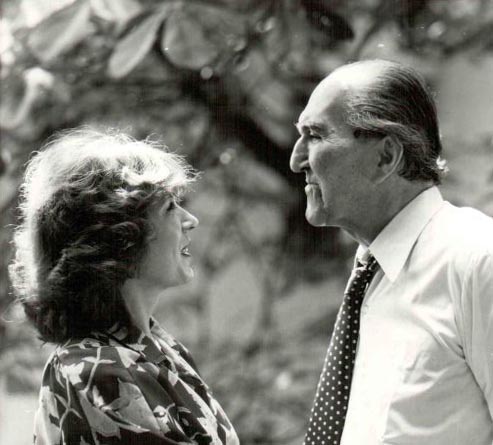
Szentkuthy Miklós és Tompa Mária, 1982 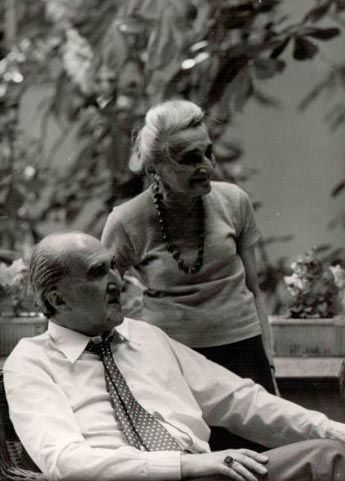
Szentkuthy Miklós és felesége, Dolly 1982.
